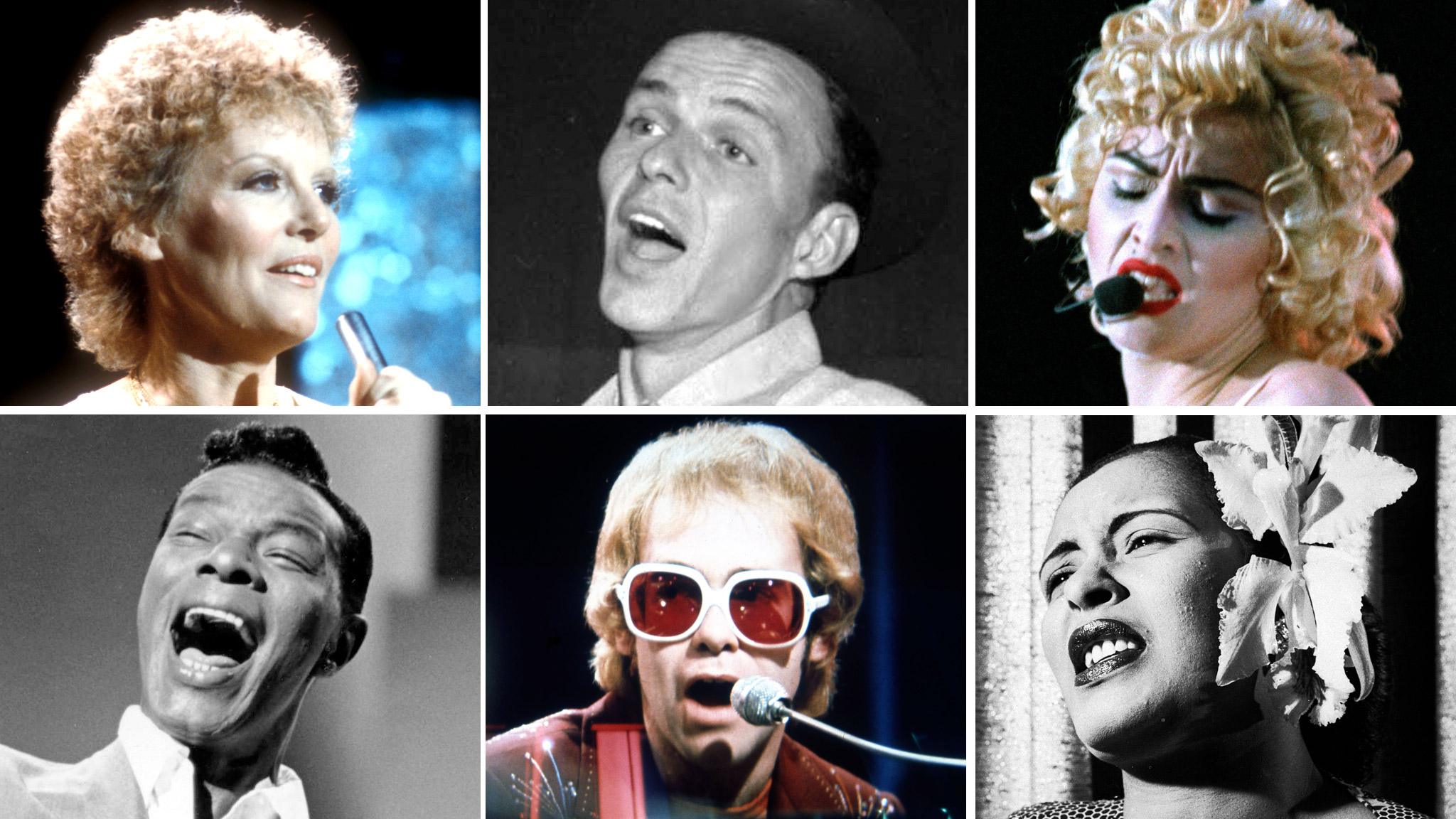New Note: The addicts who found Solace in music
- Published
'Everybody here is more than just an addict.' Inside a New Note rehearsal.
The New Note Orchestra, the only orchestra whose members are all in recovery from drug and alcohol addiction, has been nominated for a music award for a work in which the musicians tell the stories of their addiction and redemption.
Dan Blomfield is a teacher and recovering alcoholic.
At his lowest point, he was drinking up to two litres of vodka a day and was rushed to hospital several times, giving himself acute pancreatitis in the process.
Dan considered suicide after one three-day binge.
"I was at an absolute low, I really wanted to end my life, I couldn't see any way out," he says, gently cradling his acoustic guitar in his flat in Brighton. "I didn't value my life at all."
Dan's concerned wife contacted his parents, who brought him home to Cornwall, where he attempted to get sober. Like many others, he relapsed.
"I remember my mum confronted me. I wasn't the person that I wanted to be. Alcohol takes such control of you. I lied to her face.
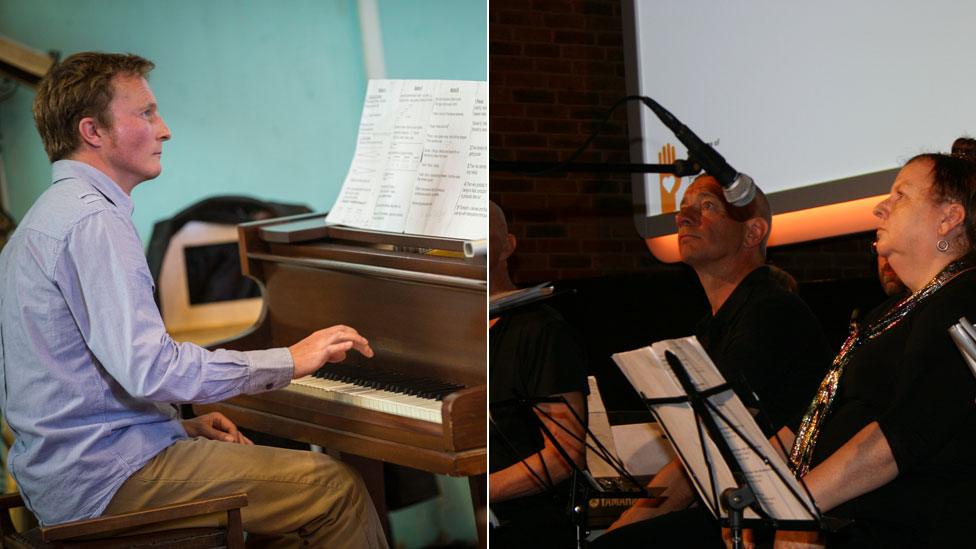
Dan Blomfield (left) and members of The New Note Orchestra
"I was able to get into rehab where I spent three months. Thinking about crying on my dad's shoulder and lying to my mum, I made a promise to myself and made it through three months and it was the longest period of being sober in my adult drinking life. Then I told myself, I can do another three months..."
On moving back to Brighton, he found out about a new community project, the New Note Orchestra.
New Note was inspired by Channel 4 documentary Addicts' Symphony - the brainchild of TV producer and the orchestra's founder Molly Mathieson.
That film followed musician James McConnel, a recovering alcoholic whose teenage son died of a heroin overdose, as he brought together 10 participants, all in recovery, to play a concert with the London Symphony Orchestra.
"I piloted the idea for New Note in the summer of 2015 and we had 20 people turn up," says Mathieson. "I had advertised loosely with drugs and alcohol services here in Brighton and when 20 people turned up, I knew there was a need for it.
"What's surprising is that nobody has done this before. We are completely and utterly unique, there is no other recovery orchestra in the world, which is kind of amazing."
The orchestra's funding comes mostly from from Arts Council England with additional money from sources like The University of Brighton.
"We do get public donations, we just don't get a lot of them," says Mathieson. "We are potentially an unfashionable cause. To help people with alcohol issues maybe isn't as sexy as another charity but I think what's happened is we've grown and people have seen that everyone in the orchestra is really passionate.
"We are reaching a community that is rarely reached, who have had drugs and alcohol issues but have also faced homelessness. I think the Arts Council are willing to back us because we are creating new pieces of music as well and we perform five or six times a year."
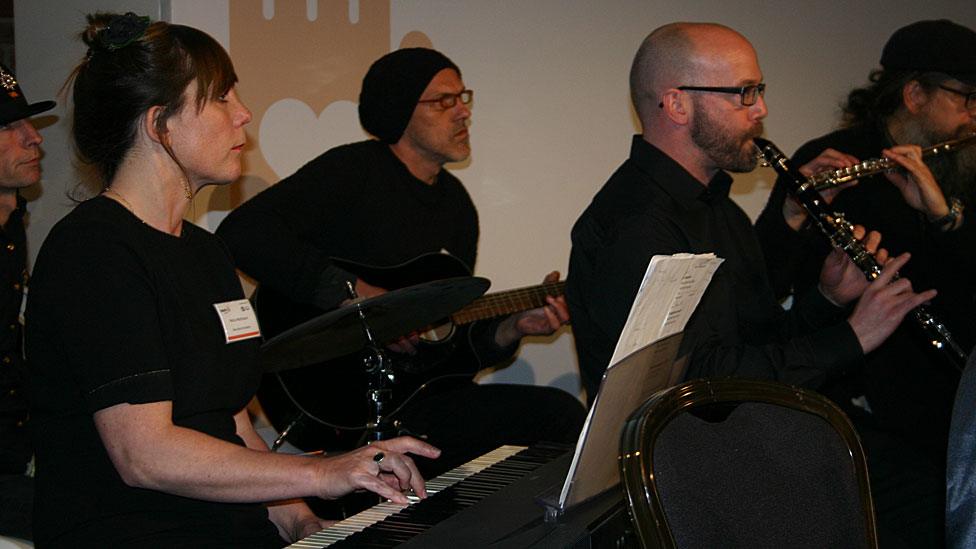
Molly Mathieson (left) says the New Note Orchestra is reaching a marginalised community
Aside from creating a safe space for those in recovery, removing the stigma of addiction is another of the orchestra's aims.
Official figures for England and Wales, external show that almost 280,000 people contacted drug and alcohol services in 2016-17 while the estimated number of adults with alcohol dependency in England is suggested to be almost 600,000.
"After some shows, we'll do a Q&A so the audience can ask questions directly of the orchestra members. It allows the public to see someone is not just that homeless drunk on a bench. The people in the orchestra have had good jobs and they're highly functioning, they are brilliant musicians but they just have had a problem with drink and drugs."
Music therapy in the treatment of issues ranging from mental health to dementia is well-documented. For its work with people in recovery from addictions, New Note has been recognised by the British Composer Awards in the best community or educational project category.
The orchestra's musical director is Conall Gleeson, a tall, softly-spoken Irishman who is also the deputy head of the School of Media at the University of Brighton.
Allow YouTube content?
This article contains content provided by Google YouTube. We ask for your permission before anything is loaded, as they may be using cookies and other technologies. You may want to read Google’s cookie policy, external and privacy policy, external before accepting. To view this content choose ‘accept and continue’.
Between moving chairs around the Brighton church where the orchestra rehearses, he says: "I came to one of the early performances and I was really taken by the project, the ambition of it and the opportunity it was offering to people in recovery, and I thought I had something to give to it."
Gleeson was not put off by the fact that many members of the orchestra had never picked up an instrument before. "Everyone has a unique sense of musicianship and the real challenge is to tap into it," he says.
"It's giving people the confidence and a safe place to make sounds. The skill is learning how to listen, not just to the sounds that you make but the sounds other people make. Being a good musician is about developing that sensitivity."
The piece for which the orchestra has been nominated is Solace, a 30-minute mix of spoken word, film and music, external. Members talk through their relationships with drink and drugs and relate the stories of how their addiction took hold.
"The people in the orchestra came up with the idea of talking about where they get their strength from and what it means to be in recovery," says Gleeson.
"There is a lot of anxiety to go through but there are also places they go to to claim solace. We thought that's a brilliant story to tell, so that was the germ for making the piece."
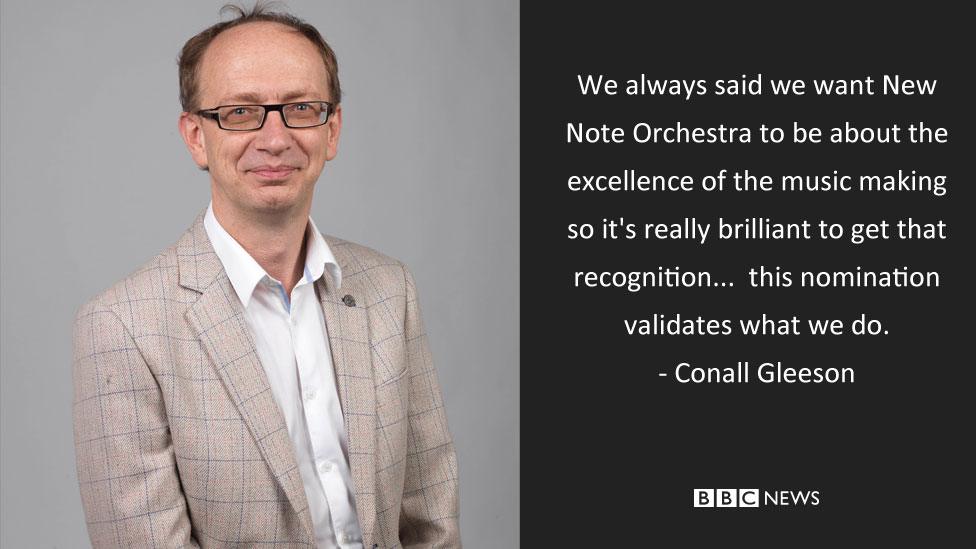
Win or lose, the work of New Note will continue and Gleeson offers a word of caution: "There is no ending to recovery, it's a continual process and people will tell you they have day-to-day challenges.
"We shy away from the word 'redemptive' because that's not what it is. It's a struggle and it's a battle but it's a positive story."
For Dan Blomfield, it's about waking up in the morning with a clear head and not hearing a little voice telling him to crack open a bottle.
"It's not something I want. I like not having that feeling of anxiety, like someone is watching me," he says. "Over the last year or so, I've been able to say really confidently on social occasions, 'I don't drink'. It's that simple and there's not this voice in the back of my head saying, 'Come on, you can just have one'."
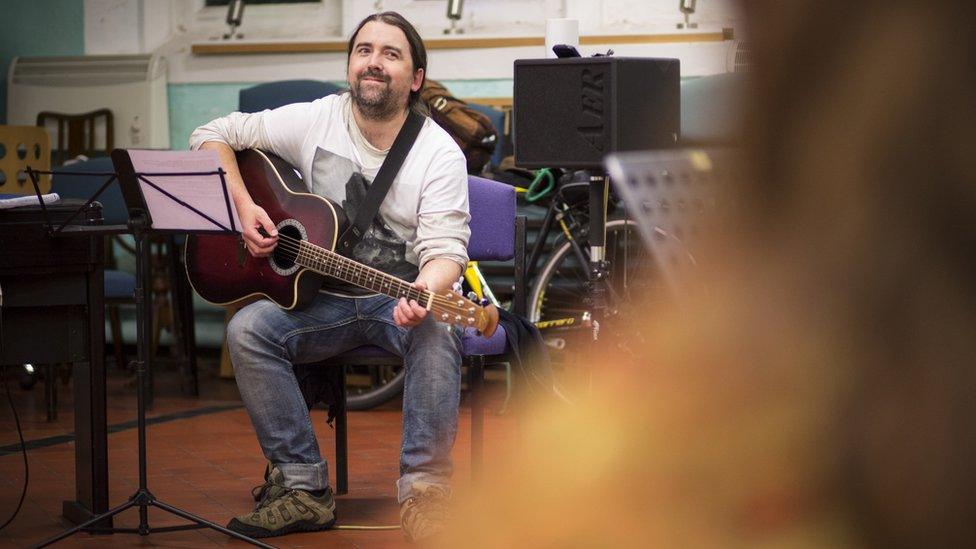
Dan says his new high comes from being on stage and having an audience appreciate his and his fellow members' creativity.
"There's so much stigma around drugs and alcohol, it's so nice to be on the stage in front of people saying, 'I'm part of this, we own this, this is us, this is part of my life.
"'If you have a problem, come and talk to me about it because I'm not ashamed of it.'
"The nomination is for the music that we're doing, not the journey that we've been on. That's an amazing side story and there's many of them, but we're actually being appreciated for the music for the quality of the work. That is an absolute honour."

Follow us on Facebook, external, on Twitter @BBCNewsEnts, external, or on Instagram at bbcnewsents, external. If you have a story suggestion email entertainment.news@bbc.co.uk, external.
- Published15 June 2017
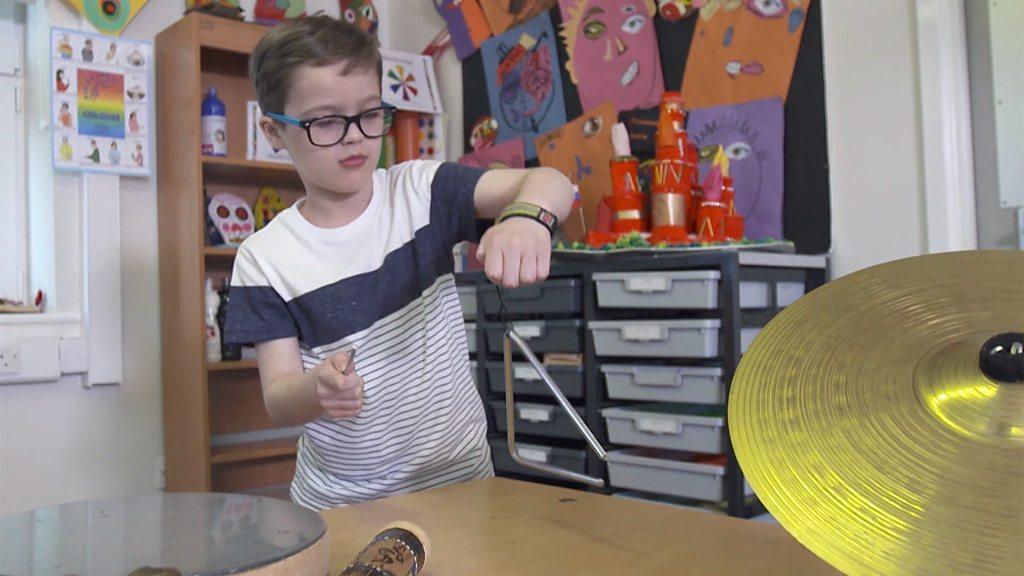
- Published28 September 2018
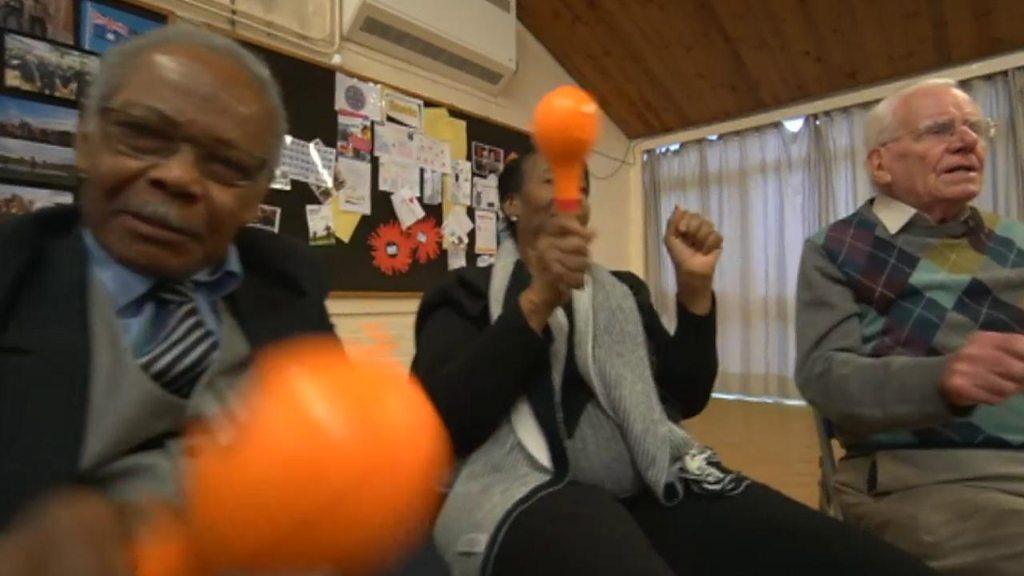
- Published28 September 2018
